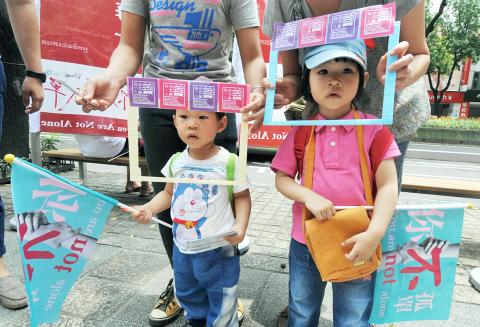Hundreds of Taiwanese and Filipinos yesterday enjoyed musical performances at the “Friendly Taiwan” event, which was initiated by several celebrities to demonstrate the nation’s friendship and appreciation for Filipino workers.
With many Taiwanese expressing negative feelings toward the Philippines and Philippine nationals in Taiwan following the fatal shooting of Taiwanese fisherman Hung Shih-cheng (洪石城) by Philippine Coast Guard personnel earlier this month, several celebrities, including Cloud Gate Dance Theatre founder Lin Hwai-min (林懷民), Alliance Cultural Foundation chairman and renowned business leader Stanley Yen (嚴長壽), and writer Giddens Ko (柯景騰) — also known by his pseudonym Jiubadao (九把刀) — organized the event in Taipei yesterday, which featured a number of local musicians.
“The purpose of this event is simple: Let’s render unto Caesar the things that are Caesar’s,” Yen said, while standing in front of a large banner that read “Thanks for your contributions.”

Photo: Mandy Cheng, AFP
“Our friends from the Philippines have long helped us out in the family or in the workplace,” he said.
“Taiwan is a diverse society and when Filipinos come to Taiwan to give us a hand, we also learn from them. When our young people go to work in China or in other countries, we would also want them to be safe and to be treated by the locals as their own people,” he added.
Yang Chao (楊照), a writer, said that hateful words not only harm others, “they also harm our consciousness and our friendliness.”

Photo: Mandy Cheng, AFP
Filipino worker Reina Nava, who took part in the event, said that she enjoyed it.
“I feel very well, it’s so nice to see so many Taiwanese extending their friendliness to us,” she said.
Lea Paray, another Filipino worker who has been working in Taiwan for 12 years, said that she enjoys working and staying in Taiwan.
“The pay is good, the people are nice and polite, I really like it,” she said. “Although some problems happened, I never feel worried because everything has been fine as always.”

Nipah virus infection is to be officially listed as a category 5 notifiable infectious disease in Taiwan in March, while clinical treatment guidelines are being formulated, the Centers for Disease Control (CDC) said yesterday. With Nipah infections being reported in other countries and considering its relatively high fatality rate, the centers on Jan. 16 announced that it would be listed as a notifiable infectious disease to bolster the nation’s systematic early warning system and increase public awareness, the CDC said. Bangladesh reported four fatal cases last year in separate districts, with three linked to raw date palm sap consumption, CDC Epidemic Intelligence

Two Taiwanese prosecutors were questioned by Chinese security personnel at their hotel during a trip to China’s Henan Province this month, the Mainland Affairs Council (MAC) said yesterday. The officers had personal information on the prosecutors, including “when they were assigned to their posts, their work locations and job titles,” MAC Deputy Minister and spokesman Liang Wen-chieh (梁文傑) said. On top of asking about their agencies and positions, the officers also questioned the prosecutors about the Cross-Strait Joint Crime-Fighting and Judicial Mutual Assistance Agreement, a pact that serves as the framework for Taiwan-China cooperation on combating crime and providing judicial assistance, Liang

The manufacture of the remaining 28 M1A2T Abrams tanks Taiwan purchased from the US has recently been completed, and they are expected to be delivered within the next one to two months, a source said yesterday. The Ministry of National Defense is arranging cargo ships to transport the tanks to Taiwan as soon as possible, said the source, who is familiar with the matter. The estimated arrival time ranges from late this month to early next month, the source said. The 28 Abrams tanks make up the third and final batch of a total of 108 tanks, valued at about NT$40.5 billion

Reports of Taiwanese going missing, being detained or interrogated, or having their personal liberties restricted in China increased about fourfold annually last year, the Mainland Affairs Council (MAC) said yesterday. Last year, 221 Taiwanese who traveled to China were reported missing, were detained and interrogated, or otherwise had their personal freedom restricted, up from 55 the previous year, the council said. Reopening group tours to China would be risky, as it would leave travelers with no way to seek help through official channels after Beijing shut down dialogue between the associations tasked with handling cross-strait tourism, the MAC said. Taipei’s Taiwan Strait Tourism